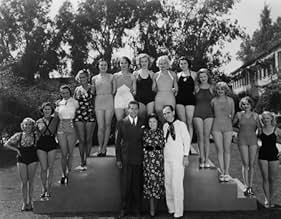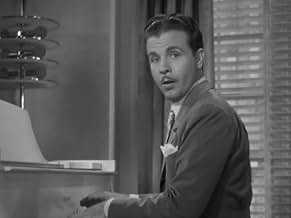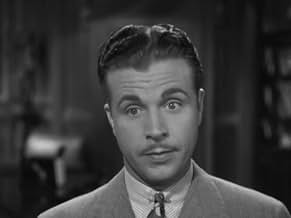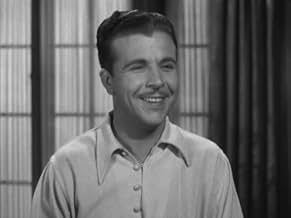VALUTAZIONE IMDb
6,4/10
1298
LA TUA VALUTAZIONE
Aggiungi una trama nella tua linguaWhen two investors inform an opportunistic dancer that they can't fund an elderly stage producer's production, she suggests they get an insurance policy on the producer's life.When two investors inform an opportunistic dancer that they can't fund an elderly stage producer's production, she suggests they get an insurance policy on the producer's life.When two investors inform an opportunistic dancer that they can't fund an elderly stage producer's production, she suggests they get an insurance policy on the producer's life.
- Regia
- Sceneggiatura
- Star
- Candidato a 1 Oscar
- 2 vittorie e 1 candidatura in totale
Charles D. Brown
- Hugo
- (as Chas. D. Brown)
William B. Davidson
- Andy Callahan
- (as Wm. Davidson)
Bobbie Adams
- Chorus Girl
- (non citato nei titoli originali)
Iris Adrian
- Verna
- (non citato nei titoli originali)
Recensioni in evidenza
Busby Berkeley musicals are always great fun to watch regardless of the storyline because of the outstanding musical sequences. Berkeley's Gold Diggers series contains some of the most exciting. Gold Diggers of 1937 is possibly the worst of the lot, but it still isn't bad. With a great cast and an interesting finale, this film is a must for fans of early musicals.
Dick Powell stars as an insurance salesman with a terrible record. He bumps into Joan Blondell on a train one day and finds his luck steadily increasing from there. Soon, he gets a client (Victor Moore) to open a million dollar insurance policy, which makes him begin to hear wedding bells. However, his client is not very young, nor is he very healthy. His business partners are counting on this. They've gambled his fortune away and now have no other way to cover their backs. With plotting from both sides, poor old Mr. Hobart is in for a heck of a ride.
Unfortunately, this film reads much more like the b-pictures that Powell and Blondell made during the slump in their careers than like the instant classics they were teamed up in at the beginning of their careers.
There are only a few songs used throughout this film, and none of them are as catchy as the ones from past installments. Still, they're created quite well visually. "Speaking of the Weather" features two stagings, the first in an office as a tet a tet between Powell and Blondell and the second at a big party. This version features an excellent tap routine. The big finale is "All is Fair in Love and War" which features a bevy of beautiful girls rocking in rocking chairs and bombing their beaus from across a largely black screen.
Dick Powell stars as an insurance salesman with a terrible record. He bumps into Joan Blondell on a train one day and finds his luck steadily increasing from there. Soon, he gets a client (Victor Moore) to open a million dollar insurance policy, which makes him begin to hear wedding bells. However, his client is not very young, nor is he very healthy. His business partners are counting on this. They've gambled his fortune away and now have no other way to cover their backs. With plotting from both sides, poor old Mr. Hobart is in for a heck of a ride.
Unfortunately, this film reads much more like the b-pictures that Powell and Blondell made during the slump in their careers than like the instant classics they were teamed up in at the beginning of their careers.
There are only a few songs used throughout this film, and none of them are as catchy as the ones from past installments. Still, they're created quite well visually. "Speaking of the Weather" features two stagings, the first in an office as a tet a tet between Powell and Blondell and the second at a big party. This version features an excellent tap routine. The big finale is "All is Fair in Love and War" which features a bevy of beautiful girls rocking in rocking chairs and bombing their beaus from across a largely black screen.
Busby Berkeley's films are the most concentrated tease in the history of movies. it is over an hour into 'Gold Diggers of 1937' before we get any real meat - an astonishing, gossamer-erotic Gatsby-orgy filmed in the manner of Riefenstahl, all glowing Aryan bodies with their glistening mammillae, and idealised framing; with the kind of multi-character cutting of a song Paul Thomas Anderson would borrow for 'Magnolia'; and a magnificent extended tap-dance leading to an agreeable Berkeley fancy, the huge male dancer hand-standing over a bridge of female arms like a fly evading a web - after two tantalising duets featuring Dick Powell and Ruby Keeler that threaten to explode into full-blown imaginative hysteria, but are cut short.
Of course, this is the Berkeley method - coitus interruptus - and our deferred gratification is mirrored in a plot where the hero must prove himself worthy of the heroine before he can have her; the final extravaganza thus functions as a sexual/marriage rite, concluding in a consummating kiss. And what an extravaganza it is - less overt than '1935', but full of fetishised phallic implements, swirling clitoral circles and rocking chairs. Against a sharp black background, our phosphorescent heroes play out their immemorial rites, the heterosexual struggle linked to war (and not to the men's advantage). This idea leads to some striking sequences, including a priapic cannon with a pair of adjacent ball-piles, and a scene of 'trench' warfare, where the skirted female soldiers in 'No Man's Land' triumph through a blitzkrieg of firearms and perfume. There is no way actual sex could ever be better than this.
It is traditional in celebrating Busby Berkeley movies to denigrate the plots as amiable, necessary time-passers before the visual disruption. I always find them highly entertaining, and '1937' has one of the best: an excellently plotted farce combining gold-diggers, an inept salesman, a hypochondriac theatre impressario and his corrupt sidekicks.
This fun plot is noticeable for two things - the extraordinary sexual honesty that persists in spite of Messrs. Hays' and Breen's best efforts: this is a Depression where a woman must prostitute herself for a meal, never mind a marriage; as Glenda Farrell says 'It is so hard to be good under the capitalistic system' (!). The film opens with Powell insisting on the link between financial security and marriage, and the glistening sea of gold moistening the opening credits certainly have a sexual force.
More enjoyable is the portrait of the two heels who try to kill their boss having lost all his money in a Stock Exchange scam, hoping to cash in on his insurance. this kind of plot is quite shocking in such a genre, and we are expected to laugh at various unsuccessful murder attempts (and we do: the whispers for help when they hurl JJ into the pool are hilarious). These are not cartoon villains but the kind of middle-aged, middle class men we might meet in film noir or the novels of Simenon, men whose souls have been made hard by routine, and the American insistence on success. They would have made good collaborators.
In 1933, the 'Gold Diggers' poignantly recorded the effects of the Depression: things haven't really improved four years later, but, significantly, the idea is emerging that if you throw enough razzmatazz, noise, bands and empty phrases at a problem it will go away. it's not for nothing that the two leads are an insurance man and an actress. Powell is amiable in a silly moustache, sillier name and a cheerful pessimism; Blondell is bubbly and serious and lovely as ever; the revelation, however, are Glenda Farrell, convincingly transforming from cynical modern woman to accomplice of scoundrels to loving wife; and Victor Moore, as the inimitable, whining, lonely JJ.
Of course, this is the Berkeley method - coitus interruptus - and our deferred gratification is mirrored in a plot where the hero must prove himself worthy of the heroine before he can have her; the final extravaganza thus functions as a sexual/marriage rite, concluding in a consummating kiss. And what an extravaganza it is - less overt than '1935', but full of fetishised phallic implements, swirling clitoral circles and rocking chairs. Against a sharp black background, our phosphorescent heroes play out their immemorial rites, the heterosexual struggle linked to war (and not to the men's advantage). This idea leads to some striking sequences, including a priapic cannon with a pair of adjacent ball-piles, and a scene of 'trench' warfare, where the skirted female soldiers in 'No Man's Land' triumph through a blitzkrieg of firearms and perfume. There is no way actual sex could ever be better than this.
It is traditional in celebrating Busby Berkeley movies to denigrate the plots as amiable, necessary time-passers before the visual disruption. I always find them highly entertaining, and '1937' has one of the best: an excellently plotted farce combining gold-diggers, an inept salesman, a hypochondriac theatre impressario and his corrupt sidekicks.
This fun plot is noticeable for two things - the extraordinary sexual honesty that persists in spite of Messrs. Hays' and Breen's best efforts: this is a Depression where a woman must prostitute herself for a meal, never mind a marriage; as Glenda Farrell says 'It is so hard to be good under the capitalistic system' (!). The film opens with Powell insisting on the link between financial security and marriage, and the glistening sea of gold moistening the opening credits certainly have a sexual force.
More enjoyable is the portrait of the two heels who try to kill their boss having lost all his money in a Stock Exchange scam, hoping to cash in on his insurance. this kind of plot is quite shocking in such a genre, and we are expected to laugh at various unsuccessful murder attempts (and we do: the whispers for help when they hurl JJ into the pool are hilarious). These are not cartoon villains but the kind of middle-aged, middle class men we might meet in film noir or the novels of Simenon, men whose souls have been made hard by routine, and the American insistence on success. They would have made good collaborators.
In 1933, the 'Gold Diggers' poignantly recorded the effects of the Depression: things haven't really improved four years later, but, significantly, the idea is emerging that if you throw enough razzmatazz, noise, bands and empty phrases at a problem it will go away. it's not for nothing that the two leads are an insurance man and an actress. Powell is amiable in a silly moustache, sillier name and a cheerful pessimism; Blondell is bubbly and serious and lovely as ever; the revelation, however, are Glenda Farrell, convincingly transforming from cynical modern woman to accomplice of scoundrels to loving wife; and Victor Moore, as the inimitable, whining, lonely JJ.
GOLD DIGGERS OF 1937 (Warner Brothers, 1936), directed by Lloyd Bacon, is the third musical in the yearly-titled series with the choreography by Busby Berkeley. Released in theaters as a Christmas attraction of 1936, I find it to be a notch below the 1935 edition and no where near as good as the one of 1933, but still acceptable entertainment, highlighted with a show-stopping musical finale.
The story begins at a convention in Atlantic City where Andy Callahan (William B. Davidson) of Good Life Insurance Company tries to encourage his salesmen to go out and sell. Rosmer "Ross" Peek (Dick Powell) and "Boop" Oglethorpe (Lee Dixon, in his feature film debut) are his two top insurance salesmen who lead the men into singing their way to the train station for their destination being New York City. While on the train, Boop becomes acquainted with a Southern gal named Sally (Rosalind Marquis); Ross meets up with Norma Perry (Joan Blondell), a stranded showgirl accompanied by Genevieve Larkin (Glenda Farrell), who in turn meets Monty Wethered (Osgood Perkins, father of Anthony Perkins), a crooked backer of JJ Hobart Productions. Rosmer helps Norma by offering her a position as his secretary at the insurance firm. As for Genevieve, she joins forces with Monty's assistant, Mr. Hugo (Charles D. Brown), another chiseler who has pocketed and lost most of Hobart's investments. They want to get the 59-year-old theatrical bachelor producer, JJ Hobart (Victor Moore) to take on an insurance policy by having Genevieve arrange to have Norma get Ross to meet up with him. After Hobart passes the million dollar insurance policy physical with Ross hired as his agent, Monty and Hugo try their best to see that Hobart meets with an "accident." But when all else fails, Hobart eventually does land in the hospital after Genevieve has a change of heart and tells him the truth. It is then up to the younger crowd, who feel that Hobart might die, to do away with the crooks Monty and Hugo and help put Hobart's upcoming show together.
Songs featured include: "The Life Insurance Song," "Speaking of the Weather" and "Let's Put Our Heads Together" By E.Y. Harburg and Harold Arlen; "With Plenty of Money and You" and "All's Fair in Love and War" by Harry Warren and Al Dubin. Dick Powell, with his pencil-thin mustache, sings "With Plenty of Money and You" before the opening titled cast and credits. He reprises the hit money song to Blondell later on in the story as he accompanies her home from their dinner date. "Speaking of the Weather" also gets to be heard twice, first in the insurance office sung by Powell to Blondell, later sung by guests at the pool and garden party with Lee Dixon doing his "puppet on a string" tap-dancing solo. Also sung during the party sequence is "Let's Put Our Heads Together" (a pretty tune introduced by Powell). Of the songs presented, "All's Fair in Love and War" is the only number not part of the storyline. It's a ten minute staged production, part of the JJ Hobart Revue, compliments of Busby Berkeley and his display of chorus girls marching in military fashion and flag waving. This well choreographed finale was nominated for Best Dance Direction, and one of the few highlights of the film.
Victor Moore, a pudgy bald character actor of numerous comedies, comes off best here. Besides being an amusing comedian whose catch phrase if, "Life begins at 59," the scene that stands out most is the moment he gets sentimental in telling gold-digger Genevieve (Farrell) of he being a lonely old man of the theater whose life has now been fulfilled by her presence in making him feel young again, and now wanting to marry her. Even Farrell manages to present herself as a gold-digger with a heart of gold, and she carries this particular scene well without making it appear silly. As for Powell, his character at times appears to be more foolish than funny, but makes up for it during the romantic and singing spots.
THE GOLD DIGGERS OF 1937 became available on DVD in 2008, and can bee seen broadcast on Turner Classic Movies. Look fast for a young Jane Wyman in the early portion of the movie with one line, "Happy days are here again" as she and other show girls watch a parade of insurance men entering the train, and Susan Fleming (Mrs. Harpo Marx) in a small role as a secretary billed as Lucille. (***)
The story begins at a convention in Atlantic City where Andy Callahan (William B. Davidson) of Good Life Insurance Company tries to encourage his salesmen to go out and sell. Rosmer "Ross" Peek (Dick Powell) and "Boop" Oglethorpe (Lee Dixon, in his feature film debut) are his two top insurance salesmen who lead the men into singing their way to the train station for their destination being New York City. While on the train, Boop becomes acquainted with a Southern gal named Sally (Rosalind Marquis); Ross meets up with Norma Perry (Joan Blondell), a stranded showgirl accompanied by Genevieve Larkin (Glenda Farrell), who in turn meets Monty Wethered (Osgood Perkins, father of Anthony Perkins), a crooked backer of JJ Hobart Productions. Rosmer helps Norma by offering her a position as his secretary at the insurance firm. As for Genevieve, she joins forces with Monty's assistant, Mr. Hugo (Charles D. Brown), another chiseler who has pocketed and lost most of Hobart's investments. They want to get the 59-year-old theatrical bachelor producer, JJ Hobart (Victor Moore) to take on an insurance policy by having Genevieve arrange to have Norma get Ross to meet up with him. After Hobart passes the million dollar insurance policy physical with Ross hired as his agent, Monty and Hugo try their best to see that Hobart meets with an "accident." But when all else fails, Hobart eventually does land in the hospital after Genevieve has a change of heart and tells him the truth. It is then up to the younger crowd, who feel that Hobart might die, to do away with the crooks Monty and Hugo and help put Hobart's upcoming show together.
Songs featured include: "The Life Insurance Song," "Speaking of the Weather" and "Let's Put Our Heads Together" By E.Y. Harburg and Harold Arlen; "With Plenty of Money and You" and "All's Fair in Love and War" by Harry Warren and Al Dubin. Dick Powell, with his pencil-thin mustache, sings "With Plenty of Money and You" before the opening titled cast and credits. He reprises the hit money song to Blondell later on in the story as he accompanies her home from their dinner date. "Speaking of the Weather" also gets to be heard twice, first in the insurance office sung by Powell to Blondell, later sung by guests at the pool and garden party with Lee Dixon doing his "puppet on a string" tap-dancing solo. Also sung during the party sequence is "Let's Put Our Heads Together" (a pretty tune introduced by Powell). Of the songs presented, "All's Fair in Love and War" is the only number not part of the storyline. It's a ten minute staged production, part of the JJ Hobart Revue, compliments of Busby Berkeley and his display of chorus girls marching in military fashion and flag waving. This well choreographed finale was nominated for Best Dance Direction, and one of the few highlights of the film.
Victor Moore, a pudgy bald character actor of numerous comedies, comes off best here. Besides being an amusing comedian whose catch phrase if, "Life begins at 59," the scene that stands out most is the moment he gets sentimental in telling gold-digger Genevieve (Farrell) of he being a lonely old man of the theater whose life has now been fulfilled by her presence in making him feel young again, and now wanting to marry her. Even Farrell manages to present herself as a gold-digger with a heart of gold, and she carries this particular scene well without making it appear silly. As for Powell, his character at times appears to be more foolish than funny, but makes up for it during the romantic and singing spots.
THE GOLD DIGGERS OF 1937 became available on DVD in 2008, and can bee seen broadcast on Turner Classic Movies. Look fast for a young Jane Wyman in the early portion of the movie with one line, "Happy days are here again" as she and other show girls watch a parade of insurance men entering the train, and Susan Fleming (Mrs. Harpo Marx) in a small role as a secretary billed as Lucille. (***)
Dick Powell is an insurance salesman who sells a million dollar policy to a producer in "Gold Diggers of 1937" also starring Joan Blondell, Victor Moore, Osgood Perkins and Glenda Farrell.
Due to bad investments by his staff, producer/hypochondriac Hobart (Moore) has no idea that the show he's planning to put on can't be financed. The men responsible for losing his money get Rosmer (Powell), an insurance salesman, to sell Hobart a $1 million policy, figuring he won't live and then the show can be done.
The funniest part of the movie is when Rosmer tells his fellow insurance salesmen of his coup and then announces that Hobart is 59. "59!" one of them exclaims. "He'll never pass the physical." "We sold a policy to a 68-year-old last year," someone says, "and he passed." "Yeah," the reply is, "passed OUT."
Interesting that 59 was thought of as more than 79 in the '30s. Coincidentally, Dick Powell himself died at the age of 59.
It's Rosmer's job to keep Hobart alive and it's his partners' job to help him to the pearly gates. They send in Glenda Farrell to break his heart, figuring he'll want to end it all, but things don't work out as they planned.
They throw him in a pool at a party; he doesn't catch cold, nor does he drown. It's actually pretty funny.
There are some pleasant songs which Powell sings beautifully, and a big Busby Berkeley number at the end, but I imagine as this is part of a series of "Gold Digger" films, audiences wanted something more.
The performances are good - chameleon Powell is a great, earnest salesman, Joan Blondell (who was either Powell's wife or about to become his wife) is adorable as a showgirl, and Moore is hilarious. Glenda Farrell is a real scene-stealer with her great line delivery.
Pleasant but not much as far as musical values.
Due to bad investments by his staff, producer/hypochondriac Hobart (Moore) has no idea that the show he's planning to put on can't be financed. The men responsible for losing his money get Rosmer (Powell), an insurance salesman, to sell Hobart a $1 million policy, figuring he won't live and then the show can be done.
The funniest part of the movie is when Rosmer tells his fellow insurance salesmen of his coup and then announces that Hobart is 59. "59!" one of them exclaims. "He'll never pass the physical." "We sold a policy to a 68-year-old last year," someone says, "and he passed." "Yeah," the reply is, "passed OUT."
Interesting that 59 was thought of as more than 79 in the '30s. Coincidentally, Dick Powell himself died at the age of 59.
It's Rosmer's job to keep Hobart alive and it's his partners' job to help him to the pearly gates. They send in Glenda Farrell to break his heart, figuring he'll want to end it all, but things don't work out as they planned.
They throw him in a pool at a party; he doesn't catch cold, nor does he drown. It's actually pretty funny.
There are some pleasant songs which Powell sings beautifully, and a big Busby Berkeley number at the end, but I imagine as this is part of a series of "Gold Digger" films, audiences wanted something more.
The performances are good - chameleon Powell is a great, earnest salesman, Joan Blondell (who was either Powell's wife or about to become his wife) is adorable as a showgirl, and Moore is hilarious. Glenda Farrell is a real scene-stealer with her great line delivery.
Pleasant but not much as far as musical values.
...from Warner Brothers/First National, director Lloyd Bacon, and dance choreographer/director Busby Berkeley. A group of showgirls, including Norma (Joan Blondell) and Genevieve (Glenda Farrell), grow tired of struggling with poverty, so they set out to change their circumstances. Norma meets insurance salesman Rosmer Peak (Dick Powell), and he gets her a job at his firm. Genevieve falls in with shady theatrical bookkeeper Morty (Osgood Perkins) who's trying to get out from under the debt of theater owner J.J. Hobart (Victor Moore), and who concocts a plan that brings them into contact with Rosmer and Norma.
The musical format had started to change in cinema by this point. Whereas previous films had largely kept musical numbers confined to the stage on which they were ostensibly being shown to the "audience" within the film's narrative, now more and more songs were being performed out "in the world", with characters breaking out into song while walking down the street or sitting in a park. Berkeley's only major number comes at the very end, an elaborate fantasia that is supposedly being viewed by a theater audience but actual defies all physics of reality. It's interesting to look at, but isn't terribly inspired. Dixon, who I'm unfamiliar with, gets a couple of tap-dancing showcases, including one on a giant rocking chair seat. I enjoyed Moore, and I always welcome Blondell and Farrell, but the movie is only passable. Berkeley earned an Oscar nomination for Best Dance Direction. Look out for Carole Landis and Jane Wyman among the chorus girls.
The musical format had started to change in cinema by this point. Whereas previous films had largely kept musical numbers confined to the stage on which they were ostensibly being shown to the "audience" within the film's narrative, now more and more songs were being performed out "in the world", with characters breaking out into song while walking down the street or sitting in a park. Berkeley's only major number comes at the very end, an elaborate fantasia that is supposedly being viewed by a theater audience but actual defies all physics of reality. It's interesting to look at, but isn't terribly inspired. Dixon, who I'm unfamiliar with, gets a couple of tap-dancing showcases, including one on a giant rocking chair seat. I enjoyed Moore, and I always welcome Blondell and Farrell, but the movie is only passable. Berkeley earned an Oscar nomination for Best Dance Direction. Look out for Carole Landis and Jane Wyman among the chorus girls.
Lo sapevi?
- QuizMultiple references to 'carloadings' being up, meaning an increase in the total amount of goods shipped by railroad. Back before stores and other businesses reported total monthly sales, carloadings was the best available measure of consumer spending.
- Blooper(at around 20 min) A string used to make a stack of books fall onto Dick Powell's head is clearly visible against the white paper background.
- Citazioni
Rosmer Peak: Would you call Andy if I kiss you?
Norma Perry: Not unless you want to kiss him too.
- Curiosità sui creditiThe usual disclaimer goes to great lengths to assure us that "The names of all characters -- The characters themselves -- The story - all incidents and institutions portrayed in this production are fictitious -- And no identification with actual persons, living or deceased, is intended or should be inferred."
- Versioni alternativeThere is an Italian edition of this film on DVD, distributed by DNA srl, "VIVA LE DONNE! (1933) + AMORE IN OTTO LEZIONI (1936)" (2 Films on a single DVD), re-edited with the contribution of film historian Riccardo Cusin. This version is also available for streaming on some platforms.
- ConnessioniEdited into Busby Berkeley and the Gold Diggers (1969)
- Colonne sonoreWith Plenty of Money and You
(1936)
Music by Harry Warren
Lyrics by Al Dubin
Sung by Dick Powell (uncredited)
I più visti
Accedi per valutare e creare un elenco di titoli salvati per ottenere consigli personalizzati
- How long is Gold Diggers of 1937?Powered by Alexa
Dettagli
- Tempo di esecuzione1 ora 41 minuti
- Colore
- Mix di suoni
- Proporzioni
- 1.37 : 1
Contribuisci a questa pagina
Suggerisci una modifica o aggiungi i contenuti mancanti

Divario superiore
By what name was Amore in otto lezioni (1936) officially released in India in English?
Rispondi


































